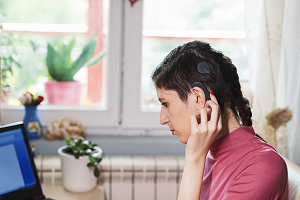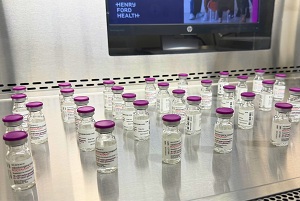No More 90-Minute Drives: Henry Ford Health Expands Cochlear Implant Care Closer to Home

JACKSON, Mich. – The decision to get cochlear implants changed everything for Abigail Soper — at work, at home and especially as a mom of two young girls. But one thing she didn’t expect was how modern technology would make managing her hearing care easier than ever.
A registered nurse in Jackson, Soper is now one of several patients benefiting from a new remote-programming service that brings her cochlear implant follow-up care to an eight-minute drive instead of regular 90-minute drives to Detroit.
“Now, I just walk across the street, sit at a computer in the hearing center, and talk to Dr. Conrad on a video call,” Soper said. “They connect my implant to the computer, and we go through my checkup — just like she’s in the room with me.”
The virtual appointments at the Henry Ford Cochlear Implant Program are offered in partnership with the Jackson Hearing Center.
The remote programming appointments are designed for follow-up visits, including the routine annual checkups where audiologists run diagnostics on the implant and fine-tune sound levels digitally. Patients sit in front of a computer screen at the Jackson clinic while audiologist connects virtually, adjusting their devices in real time with the support of a local technician.
While patients still travel to Detroit for the initial cochlear implant surgery and activation, all follow-up programming visits — up to six in the first year — can now be done remotely. Patients also continue with annual visits.
“It’s a game-changer for people who live in communities in the surrounding Jackson area,” said Henry Ford Health Audiologist Chelsea Conrad, Au.D. “Many of our patients are in their 70s and 80s. Asking them to make a nearly three-hour round trip to Detroit for care just isn’t realistic long-term. This program removes that barrier.
“Just because someone lives outside a major metro area doesn’t mean they shouldn’t have expert care. This model brings that expertise closer to home — it’s the same level of care, just with fewer miles in between.”
For Soper, the benefits go beyond convenience. Her hearing loss, caused by a rare autoimmune condition called Cogan’s Syndrome, worsened over a decade. When the pandemic hit, masks made lip-reading impossible and conversations with patients and coworkers nearly unmanageable. She knew it was time for a change.
“I couldn’t hear my patients anymore,” Soper said. “That was the final push for me. Getting the implants was a big step — but it’s one of the best decisions I’ve ever made.”
She received her first implant four years ago, and the second a year later. At first, the sounds were overwhelming — high-pitched, electrical, and unfamiliar. But with time and determination, her brain adapted.
“I was worried my daughters' voices might sound different,” she admitted. “But they don’t. I hear them more clearly now than I ever did before. It’s something I can’t even put into words.”
Today, Soper is thrilled that Jackson-area patients — especially older adults or those with limited mobility — have access to the same advanced care without the burden of travel.
“Technology can be intimidating, especially for some of the elderly generation of patients,” she said. “But the staff here make it easy. You’re just sitting at a computer, chatting with the audiologist, doing everything you would do in Detroit.”
Henry Ford Health’s cochlear implant patients range in age from 17 to 90-plus, with the average age around 75. The remote model saves time, mileage, and energy — and ensures patients are part of a broader initiative to break down geographic barriers and bring world-class medical services to patients living in all corners of Michigan.
“I work long nights and I have young kids,” Soper said. “This setup makes it possible to stay on top of my care without missing a beat. It’s efficient, it's effective, and most of all, it’s personal.”
###
Media Contact: mediarelations@hfhs.org
.svg?iar=0&hash=F6049510E33E4E6D8196C26CCC0A64A4)

/hfh-logo-main--white.svg?iar=0&hash=ED491CBFADFB7670FAE94559C98D7798)









